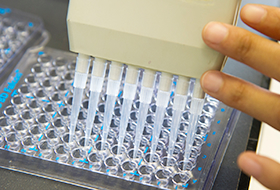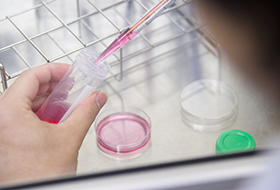 |
| |

|
| |
|
Promoting research using birds and fish to understand the mechanics of the
human immune system
|
| |
 |
|
Professor Furusawa, his specialty is immunology. His research
focuses on investigating the immune system of living organisms. Generally,
we are not able to make any breakthroughs in the research of the defense
mechanism in living creatures by only doing research using humans and
mammals, he began to study this phenomenon using chickens, a non-mammalian
model, to study the memory mechanism in the immune system.
First of all, the term of "Immunity" means escape from a disease. One of the
most noted phenomenons of the immune system is memory system. When an
antigen, a harmful substance that causes a disease such as a virus, enters
the body, antibodies are produced. Consequently, when the same antigen
enters the body a second time, the person does not become sick. However,
according to Professor Furusawa, the antibody production is only one
function of the immune system. |
|
| |
| The immune system consists of two functional components— ;the
innate immune system, which is the body’s natural defense mechanism, and the
adaptive immune system, which is an acquired defense mechanism. The
antigen-antibody reaction is included in the adaptive immune system. A
balance between stimulation of and suppression of immune system are
important for both the innate and adaptive immune systems. A destruction in
this balance triggers autoimmune disorders, allergies, and other diseases.
|
|
| |
When Professor Furusawa was writing his college graduate
thesis, he encountered a special book on immunology which sparked his
interest in the immune system and led to his research in the field.
Encountering this book was a decisive factor that determined the path he
took in his life.
Professor Furusawa said, most researchers in immunology work in the field of
medicine and they are using mouse as the experimental animal. He stated, “In
my lab, we do research using other animals to investigate the memory system
in immune response. This also helps us to understand how to enhance disease
resistance in livestock and fish and thereby plays a role in contributing to
the agriculture and forestry marine products industry. When he moved to
Hiroshima University, his research has focused on chickens and fish, and the
results lead to the establishment of the venture company and, as a technique
of the departure from Hiroshima University, help the society. This technique
is useful for not only medical area but also globally. |
|
 |
|
| |
|
Laboratory is unrivaled globally in the study of the immune system of
chickens; carrying out research that can only be conducted at this lab
|
| |
 |
|
Professor Furusawa and his laboratory elucidated the important
part of the mechanism of the immunologic memory system so far. The making of
a useful antibody is successful and achieves many achievements. One
distinctive accomplishment made in the area of applied research was the
development of technology for chicken monoclonal antibody production.
Monoclonal antibodies are not only used in reagents but have been proven to
also be highly effective for their use in drug therapies. At present,
mammalian monoclonal antibodies are produced solely from mouse cells and
Professor Furusawa’s lab is the only one in the world that possesses the
technologies to produce chicken monoclonal antibodies.
Moreover, we were surprised to find that the chickens being used in studying
are unique to the lab and cannot be found elsewhere. |
|
| |
According to Professor Furusawa, the chickens used by his lab
were supplied by the Basel Institute of Immunology in Basel, Switzerland.
Professor Furusawa’s lab is the only place in Japan that raises and
maintains these chickens. His lab was also successful in globally pioneering
the development of technologies to produce chicken monoclonal
antibodies.
Furthermore, according to the professor, up until recently the mechanism of
action for chicken vaccines was not clearly understood. Research thus far
indicates that the germinal center (GC) is at the core of the immune memory
system in chickens. Currently, progress is also being made in understanding
the details of the immune system in mammals.
Professor Furusawa is currently working to decipher the memory mechanism in
the immune system of fish.
“The interesting thing is that fish do not have a germinal center,” says
Professor Furusawa, “but the administration of vaccines is somehow effective
so we are determined to unravel the mysteries of this mechanism in fish.”
|
|
 |
|
| |
|
The university is a place of learning where students benefit from prominent
researchers; our aim is to make student to be a talented graduate in the society.
|
| |
|


|
|
The major goal of Professor Furusawa’s research is the pursuit
of a universal truth. Meanwhile, another major goal is to contribute to
society by understanding mechanisms, such as the effective methods for
administering vaccines, through the research of chickens and fish. The
ultimate thrill of doing research is encountering a phenomenon that exceeds
the boundaries of the human imagination.
Professor Furusawa says he is confident that his lab is working in the front
lines globally using chickens for our research. I am an educator (The person
who helps with the learning of the student). He believes that the university
is a place to nurture people, through cutting-edge research, to endow them
with various talents, such as with creativity, applied skills, and
problem-solving capabilities.
Based on this belief, the professor’s lab incorporates a variety of methods
to foster skills necessary to play an active part in the global arena,
including weekly brainstorming meetings and opportunities to receive
research guidance in English, thanks to the cooperation of an Egyptian
co-researcher, who was the professor’s student.
Each year the professor plans a trip to the river where students use a
diving mask to observe fish. Students are taught the basics on how to dive
and snorkel. The students use what they learn from their observation to
raise fish for their lab tests. Students perform the care of the chicken
which students uses in their experiments.
Professor Furusawa says He wants to help the person who is interested in
immunology widely. He wants students to not only gain technical knowledge
through research in immunology, but also wants them to solidly acquire the
basic skills, such as the capability to identify and solve problems, and
creativity, of an adult and graduate. |
|
| |
| Shuichi Furusawa (PhD in Medicine) |
Professor
Laboratory of Immunobiology, Dept. of Biofunctional Science & Technology, Molecular
& Applied Biosciences Div.
Mar. 1979 Graduate; Department of Biology, School of Science, Toho University
Apr. 1, 1979 - Jul. 31, 1984 Educational Affairs staff, Teikyo University (School of
Medicine)
Apr. 1, 1981 - Sep. 30, 1981 Research Assistant, Department of Medicine, Harvard
University
Aug. 1, 1984 - Mar. 31, 1985 Research Assistant, Teikyo University (School of
Medicine)
Jan. 1, 1985 - Jul. 31, 1990 Assistant, Teikyo University (School of Medicine)
Mar. 1, 1985 - May 1, 1987 Research Fellow, Department of Pathology, School of Medicine,
New York University
Aug. 1, 1990 - Sep. 30, 1992 Assistant, Juntendo University (School of Medicine)
Dec. 1, 1990 - Sep. 30, 1992 Visiting associate professor, New York University
Oct. 1, 1992 - Mar. 31, 1995 Research Fellow, Agriculture, Forestry and Fisheries
technician, National Institute of Animal Health, Ministry of Agriculture, Forestry and
Fisheries (MAFF)
Apr. 1, 1995 - Mar. 31, 2004 Assistant Professor, Hiroshima University (School of
Applied Biological Science)
Apr. 1, 2004 - present Professor, Hiroshima University, Graduate School (Graduate School
of Biosphere Science)
Posted on Aug 8, 2014
|
| |








